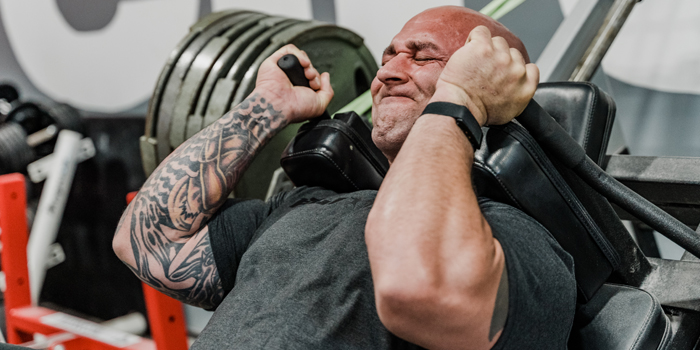
The Problem(s)
The first problem here is that so many people get drawn into turning every workout into a competition. Go to a CrossFit gym during a group WOD, and you’ll see exactly what I mean.
Competition is the time for pushing yourself to the absolute limit, sniffing ammonia, getting psyched up, etc. You CANNOT train this way. Training to that level of stimulation will only lead you to burn out. You'll perform worse (in the longer term) or injure yourself. Training is PREPARATION for the test; it is not the test itself.
The second problem is that most people really have no idea how to think and perform optimally in high-stress situations. Sports psychology is a fast-expanding field now. There are many studies being performed on how to squeeze the best out of athletes in high-stake environments. The depth of information, although promising, can easily leave most of us feeling a bit overwhelmed.
Most of us are just average gym rats looking not to embarrass ourselves as we try to pull a deadlift personal best in a crowded commercial gym. Or maybe you compete in a strength sport and want a simple way of getting around those “on the day” nerves. Either way, we don’t have a psychology degree hanging on the wall of our home gym. We certainly don’t want to spend five hours reading a textbook or research paper when we could be spending that time getting jacked.
I outline below what I believe to be the simplest and most effective way to take inventory of your mental approach to training and competing. I’ve used this framework with plenty of competitive strength athletes with success. While it may not be particularly in-depth compared to what you may read from sports psychology experts, I find the simplicity of it works very much in its favor, especially when working with “average Joes” (which is 90 percent + of us after all).
Two Mental States
Competing (or testing) in your craft should carry with it a different mental approach to training your craft. You don’t achieve mastery through constantly being in “competition mode.” Competition is there to showcase the efforts of your training; it is not part of your training. Likewise, you cannot train for several hours, multiple days per week, with the intensity you'll compete with.
Competing is all about maximal intensity and being 100 percent in the moment. This leaves no room for conscious analysis of how you are performing and improving your skill. Whereas training is all about honing your skills and developing the physical capacities you need to excel when you compete.
These are two very different tasks that require two very different mentalities.
Training Mentality
Sometimes I think we all need to step back and remember what the term TRAIN actually means. In the context of fitness, I would define it as:
“The process of developing the required physical capacities and skills to excel at a chosen endeavour."
In a sense, training could be seen as a practice while competing and testing is your game.
In fact, old-time strongmen saw training as “lifting practice." They very rarely, if ever, went to extreme levels of intensity. Rather, they focused on a masterful and “dominant” execution of their lifts. Remember that intensity or intensiveness (how hard you push each set) and the amount of work (volume) should be inversely related. Most of the time.
In training you do more work. Therefore, you cannot go balls to the walls the same way you do in competition.
What Training IS NOT
Training IS NOT the main event. It IS NOT where we test the upper limits of our abilities. We do the (often boring and mundane) things that are needed to improve our performance during competition.
You’ve all seen a post on social media saying, “make light weights feel heavy.” It's a decent analogy of how you should approach your training so heavy weights will feel lighter.
In training, your concern is HOW you are lifting and not HOW MUCH you are lifting. The same amount of mental effort should go into squatting the empty bar as 400 pounds. That is how you make great technique truly automatic. Training is when you develop technical mastery so that it is there when you are under a load that feels like it is going to crush you on the big day.
How to Train
Training is the time to be analytical and develop the good habits that lead to success when it matters. It’s the time to film every working set and pick it apart for things you could do better. It is the time to be a technique nerd as it were.
Disclaimer: What I don’t mean by this, however, is the extremists who will see their left knee cave in one millimeter on the third rep of their warm-up set with 70 percent and decide they need to deload to an empty bar for 5x5.
As an example, take me doing a set of bicep curls. Now, I absolutely despise arm work. It is my third most hated thing behind training abs and peanut butter. Despite my hatred for it, when I’m doing a set of bicep curls (usually with pink dumbbells as my arm strength is atrocious) my mental checklist is as follows:
- Grip the floor with feet and twist out to engage glutes
- Brace abs
- Pull shoulders down and back
- Crush the handle as hard as possible
- Squeeze the bicep maximally at the top
- Contract the tricep hard on the eccentric and at the bottom
My goal is to create as much full-body tension as possible. Why? Because that is how I want my body to react when I lift anything. The more time I spend creating maximal full-body tension, the better I will be doing it, even if I practice that skill while doing a curl.
And yes, it does mean I break a sweat and make lifting my pink dumbbells hard work. But when I get my hands on a 600-pound deadlift, my body goes straight in to autopilot. So, as a competitive powerlifter, I’m using my training to enhance the skills I need when I compete. I practice this even when I’m training biceps.
Your training should require a high level of attention to detail towards HOW you are doing everything in your training plan. It is a constant conscious effort to ensure you are doing things better over time. If you’re simply going through the motions and just performing mindless sets and reps then your training isn’t achieving what it could be. Every rep you do is either able to make you more or less prepared, so chose which one it’s going to be.
So maybe it’s time to stop watching Tik-tok during your workouts and ask yourself:
Are you really TRAINING or are you just going to the gym?
If you’re training to be more powerful or athletic, are you focusing on being as fast and explosive as possible on each movement? Are you 100 percent concentrated on mind-muscle connection and contracting the target muscle as hard as possible, if you're training to be more muscular?
Trusting Mentality
There’s a big misconception that in competition, people will “rise to the occasion.” In my experience, that’s completely bull. I’ve never seen anyone pull something phenomenal out of the bag on the big day whose training wasn’t to a similar standard. You don’t magically get better on the day.
A greek poet, Archilochus, (of all people) summed it up perfectly:
“We don’t rise to the level of our expectations; we fall to the level of our training.”
Archilochus
It’s as brutally simple as that. If you’re training is poor quality (you’re not focused, your squats are high, or whatever) then your competing will be the exact same. Your performance on the day is just the summation of your training efforts. In Zen Buddhism (yes I’m going there) this is expressed as:
“How you do anything is how you do everything”
Which I think is a great way of looking at it. If you do everything right in your training then on the day there should be precious little to “think” about it.
In fact, if you are properly prepared, you should almost fully be left to your subconscious. During a truly max lift or event, if you have to stop to think, you’ve probably already lost it.
So the one word I would use to quantify your mental state during the event would be TRUST. Trust the process you’ve been through, trust that you have prepared your body in the best way possible, and trust in your ability to perform the task at hand.
This leaves your mind free to focus wholly on one thing; applying 100 percent effort to your performance. And trust me, if you’ve ever applied a true 100 percent effort to a lift, you will know that it leaves precisely ZERO room to think about anything else.
Conclusion
So, there is the secret to mastering your training and testing mindsets.
Train better day in and day out.
And when competing, be more like a Shaolin Monk.
Tom Sheppard is a UK-based strength coach and competitive powerlifter. His coaching career began as an strength and conditioning coach at the University of St. Andrews. As a competitor, Tom broke European and World Records as a Junior and now runs a large UK-based powerlifting team.










